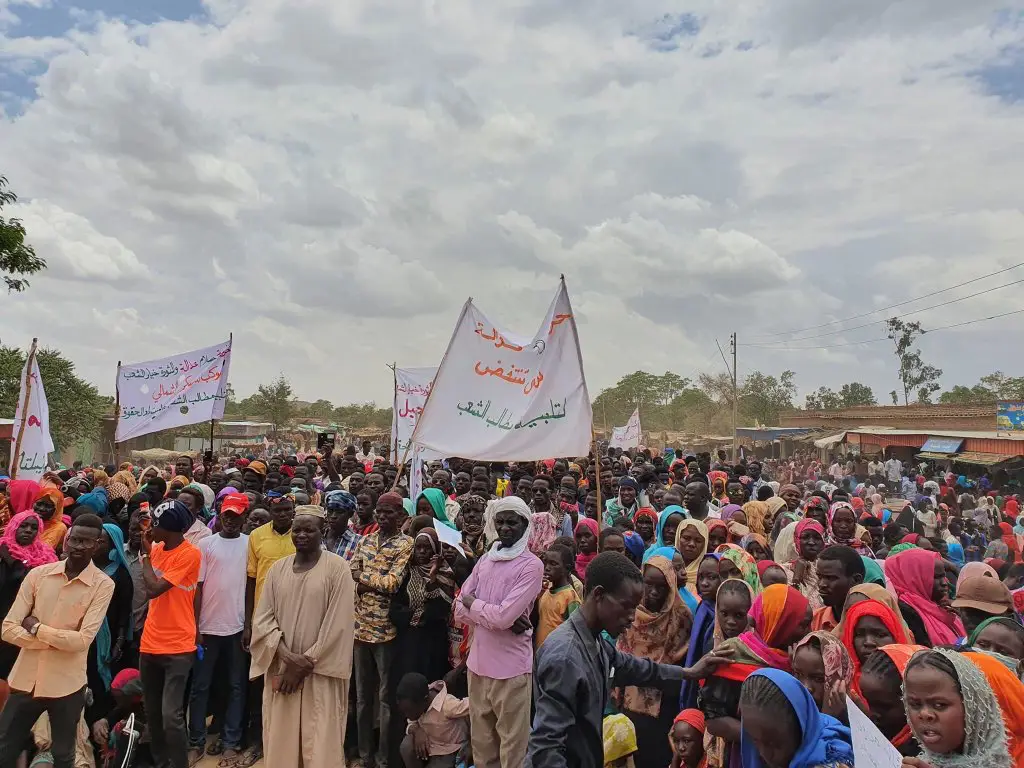In today’s world, injustice in all its forms is rampant. Governments and citizens agree to constitutional rights and rules to quell crime and wickedness, yet still injustice remains. Perpetrators are known but actions against them are often not taken due to lack of evidence or legal loopholes abused by ‘devil’s advocate’ lawyers. However, here in Sudan, it seems that the only vehicle for injustice is authority. Authoritarianism, corruption and nepotism drove the Sudanese people to the street in December 2018 with only three demands: freedom, peace and justice. More than a year later, an ineffective legal system hampered by the Coronavirus pandemic is hindering the achievement of the revolution demands, and creating a free-zone for oppression and conflict to thrive in injustice. Why is this so and why should we be very concerned?
The first step towards a new Sudan should have begun with justice for the martyrs. There are cases that until today have not reached a verdict, and others whose verdict has been reached but not implemented. As a man once said, “Injustice plus time does not equal justice.”[1(m7.46)] It is worth noting that during a peaceful protest demanding ‘justice’ for a martyr, another innocent young man lost his life[2] – ironic, isn’t it? What this means is that the underlying problem – police brutality – has not been addressed. This is the same problem that claimed lives in December 2018, June 3rd 2019 and recently in July 2020. New protests and sit-ins indicate that the revolution’s objectives were not reached; since a revolution ends with total resolution. The fact that recent demonstrations and sit-ins in Nyertiti, Fata Borno [3] and Kabkabiya were being handled with the same level of brutality and disregard for human life only proves that the revolution is still far away from reaching its objectives.

Image by Mohamed Nureldin Abdallah/Reuters via aljazeera.com
For the last 30 years in Sudan, individuals with authority and political affiliation were immune to legal prosecution – in one way or another. They either had actual legal immunity or their influence and connections protected them from legal accountability. This is so well-known that the majority of individuals who joined the military, police and National Congress Party (NCP) during that time did so to protect themselves and not to serve other civilians.
Overtime, authority in the wrong hands created a ‘mentality of entitlement’ for its bearers. These are corrupt police officers and rogue militants who believe they are entitled to anything they want and can get away with any crime since they are shielded by their status and in some cases, firearms. This is what is happening in states outside of Khartoum, particularly Darfur, with civilians suffering at the hands of such armed bandits disguised as military officers. For example, they shot innocent civilians[4], sieged areas[5] , raided villages[6] and committed many more atrocious acts wearing official uniforms with duty firearms. The forces that ought to protect civilians are now becoming an invincible enemy without any repercussions.
In Khartoum state, this ‘mentality of entitlement’ takes the form of elitist mannerisms. Assuming that because of one’s position, family name and political affiliation, they are above the law and can never be held accountable. These are the individuals who use their influence and family contacts to evade legal persecution, attain positions and bribe their way out of any situation. This is a mentality that is so deeply ingrained in our society that even after dismantling the NCP, corrupt day-to-day operations that rely on bribery and personal favors have not changed in the slightest.
Even though heads of departments and top-level managers have been fired, low-level staff that operate daily affairs have not. Today, there are the same judges, lawyers, clerks, police officers and militants that existed under the NCP. They are accustomed to malpractice, but have been rebranded as members of the new government. Hence, it is equally crucial to investigate and remove these officials as it is their superiors. Furthermore, the abstract notion of being ‘above the law’ needs to be revoked through rigorous vetting and monitoring of those who abuse their positions, as well as carrying out a total social re-education on the matter. Ultimately, people outside of the ‘immune power circle’ are forced to seek justice in one of two ways: either they pursue legal action by filing police reports and criminal cases or by taking matters into their own hands.
Those who employ the first method are met with incompetent actors of the law (judges, clerks, lawyers, etc.) and a dysfunctional legal system that exasperates plaintiffs rather than aids them. For example, a case can hold several hearings months apart before reaching a verdict. Court cases are tossed from one judge to another when one is absent, leading to further delay. Any verdict can be appealed several times, spend weeks or months in the Appeals Court, before finally being executed. Anyone can be accused of a crime by merely swearing without evidence and spend weeks to months awaiting trial in prison. The systematic flaws are endless, but does this equate injustice?

Via aajill.com
This is injustice. Officials who abuse their authority, rogue militants, biased judges and inefficient clerical staff equally constitute injustice as much as murderers, thieves and rapists because ‘justice’ is more than holding perpetrators and criminals accountable. It is a robust system (inclusive of its actors) that protects the rights, lives, and dignity of its people by ensuring that no one has the space to become a perpetrator without consequence – a true ‘Rule of Law’.
Given the laws’ incapability to protect average civilians, many resort to the second option – vigilante justice. These are the people who buy firearms, bend the law, bribe, cheat and do what they feel is necessary to protect themselves by themselves. But when people feel there is no alternative, can we really blame them? People are tired of waiting to be legally avenged and officials who “express deep regret” without any action. People are tired of being violated by armed groups that fear no punishment. This has led to what the public prosecutor’s office in a statement called a “culture of violence”[7]. A culture that is only being fuelled by the governing body’s tolerance for violation and violence. A culture learned by civilians from observing police officers and militants abuse their guns and power.
Unfortunately, this culture is globally shared by all police officers. These officers are supposed to be the “good guys” who fight to serve and protect civilians against the “bad guys”. They are trained that to use brute force to neutralize these “terrible” people is correct, acceptable and lawful. These officers reinforce these beliefs in their daily lives for years until one day, killing a “bad person” becomes acceptable. “Weren’t they going to be executed by the state anyways? Or rot in a prison cell far away from the civilized society we protect?” A perfect example is the recent death of George Floyd by Derek Chauvin, who knelt on Floyd's neck for nearly eight minutes until he later died in custody[8]. Luckily, this incident was caught on camera. Solid evidence and widespread Black Lives Matter (BLM) protests calling for the officer’s persecution paved the way for justice to be served. But without that evidence and without those protests, George Floyd would have been another unavenged life lost to police brutality and Derek Chauvin would be roaming the streets freely in search of another victim to dehumanize and murder in his ‘line of duty’.
Another factor that has pushed many civilians pursuing legal action to the edge, is the recent closure of all courts due to the Coronavirus pandemic. This closure began with the nationwide curfew back in March 2020 and has only recently been lifted in early July. Within the last three months, all legal procedures were halted and legal actors like low-level police officers and affiliates have run amok[9] .The situation was worsened by the additional closure of the Attorney General’s office, which meant new cases could not be filed. So what were victims expected to do during the closure of these legal bodies? Wait. Outrageous! A citizen’s right to not be assaulted by a police officer, report a crime or sue anyone who harasses them is a basic constitutional right that is entirely independent of the Coronavirus pandemic. Such actions embody the nonchalant and insensitive attitude of the law towards its citizens which in turn encourages people to retaliate without legal intervention. It also frustrates individuals who feel forgotten by their representatives and instigates hate against those officials. For example, an indifferent committee that visited Kutum in North Darfur to investigate the ravaged Fata Borno sit-in, was assaulted with stones from all sides, with members of the delegation getting injured and media equipment getting damaged. Pure embitterment.
Although the courts are slowly re-opening, this does not negate nor acknowledge the devastation caused by their initial closure. It also does not change the fact that gross legal reform is direly needed for justice and rule of law to prevail in Sudan. Recent dissolution and amendment of old laws[10] prove that its countless gaps can only be filled to secure democracy if the legal system is entirely replaced. Editing old laws that were founded on wrong principles of systematic oppression, racial and social prejudice are bound to produce the same biased outcomes. New laws must be written with democratic principles of equity and equality for all. What the current Ministry of Justice and its minister can do to eradicate the social and institutional aspects of injustice is to enact a rigorous new legal system with no tolerance for impunity or favor for persons with authority – a system that will outlive their time in office and serve as a blueprint for democracy to survive in Sudan. This is a prerequisite moving forward to protect civilians from small-scale, trivial charges all the way to preventing large-scale massacres in broad daylight.

Via sudanindependent.com
Given the complex nature of injustice and its aftermath, defining what ‘justice’ means today in Sudan is cumbersome to say the least. Between civil wars, selfish actors of the law and a transition in collective social consciousness, one definition of justice seems incomprehensive. Succinctly, I would say, “Justice is the action of a state to uphold its citizens’ right to a dignified, lawful existence at all times.” Pandemic or not, the lessons to be learned in this perilous time of uncertainty are a key step towards a new Sudan.
To their end, the Sudanese people have defied their primed ‘culture of violence’ and created a third approach to counter injustice – peaceful protests and sit-ins. This worked in April 2019 and successfully achieved a peaceful revolution, and more recently in Nyertiti with some of their demands being met. It is now time for the government to complete the revolution by implementing a reformed legal system and re-gaining civilian’s trust. This is vital because when civilians lose faith in the legal system that protects them, they have indirectly lost faith in their government. And if the government cannot defend its civilians nor maintain their trust through properly executing the law, why are they in office in the first place?
